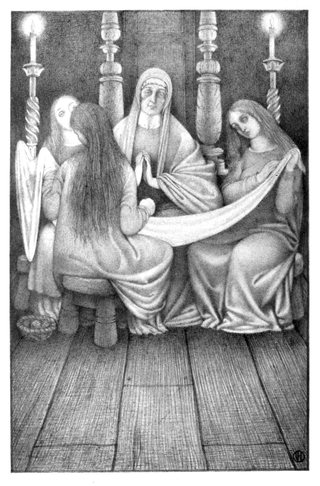
"Matty Groves", also known as "Little Musgrave and Lady Barnard" or "Little Musgrave", is a ballad probably originating in Northern England that describes an adulterous tryst between a young man and a noblewoman that is ended when the woman's husband discovers and kills them. It is listed as Child ballad number 81 and number 52 in the Roud Folk Song Index. This song exists in many textual variants and has several variant names. The song dates to at least 1613, and under the title Little Musgrave and Lady Barnard is one of the Child ballads collected by 19th-century American scholar Francis James Child.
"Lady Isabel and the Elf Knight" is the English common name representative of a very large class of European ballads.
"The Maid Freed from the Gallows" is one of many titles of a centuries-old folk song about a condemned maiden pleading for someone to buy her freedom from the executioner. Other variants and/or titles include "The Gallows Pole", "The Gallis Pole", "Hangman", "The Prickle-Holly Bush", "The Golden Ball", and "Hold Up Your Hand, Old Joshua She Cried." In the collection of ballads compiled by Francis James Child in the late 19th century, it is indexed as Child Ballad number 95; 11 variants, some fragmentary, are indexed as 95A to 95K. The Roud Folk Song Index identifies it as number 144.
The Famous Flower of Serving-Men or The Lady Turned Serving-Man is a traditional English language folk song and murder ballad. Child considered it as closely related to the ballad "The Lament of the Border Widow" or "The Border Widow's Lament".
"Unusually, it is possible to give a precise date and authorship to this ballad. It was written by the prolific balladeer, Laurence Price, and published in July 1656, under the title of The famous Flower of Serving-Men. Or, The Lady turn'd Serving-Man. It lasted in the mouths of ordinary people for three hundred years: what a tribute to the work of any writer, leave alone the obscure Laurence Price. Oral tradition, however, has made changes. The original has twenty-eight verses and a fairy-tale ending: “And then for fear of further strife, / he took Sweet William to be his Wife: / The like before was never seen, / A Serving-man to be a Queen”. – Roy Palmer, A Book of British Ballads
"The Cruel Mother" is a murder ballad originating in England that has since become popular throughout the wider English-speaking world.
"Geordie" is an English language folk song concerning the trial of the eponymous hero whose lover pleads for his life. It is listed as Child ballad 209 and Number 90 in the Roud Folk Song Index. The ballad was traditionally sung across the English speaking world, particularly in England, Scotland and North America, and was performed with many different melodies and lyrics. In recent times, popular versions have been performed and recorded by numerous artists and groups in different languages, mostly inspired by Joan Baez's 1962 recording based on a traditional version from Somerset, England.
"The Wee Wee Man" is an Anglo-Scottish border ballad, existing in several variants.

"Lord Thomas and Fair Annet", also known as "Lord Thomas and Fair Eleanor", is an English folk ballad.
"The Twa Magicians", "The Two Magicians", "The Lady and the Blacksmith", or "The Coal Black Smith" is a British folk song. It first appears in print in 1828 in two sources, Peter Buchan's Ancient Ballads and Songs of the North of Scotland and John Wilson's Noctes Ambrosianae #40. It was later published as number 44 of Francis James Child's English and Scottish Popular Ballads. During the 20th century, versions of it have been recorded by a number of folk and popular musicians.
"Clerk Colvill" or "Clerk Colven" otherwise known as "The Mermaid", is a traditional English-language folk ballad. This ballad was one of 25 traditional works included in Ballads Weird and Wonderful (1912), where it was illustrated by Vernon Hill.
"The Bonny Hind" is a traditional English-language folk song.
Willie and Lady Maisry, also known as William and Lady Marjorie, is an English-language traditional folk song, likely originating in Scotland. In the liner notes to folk musician Joe Rae's recording of this song, Rod Stradling writes that "Joe believes that the ballad is set in the area around Selkirk—possibly at Thirlstane Castle, in Lauderdale, to the north-east of Selkirk."
"The Knight and the Shepherd’s Daughter" is an English ballad, collected by Francis James Child as Child Ballad 110 and listed as number 67 in the Roud Folk Song Index.
Clerk Saunders is an English-language folk song, likely originating somewhere in England or Scotland. It exists in several variants.
The Wylie Wife of the Hie Toun Hie is an Anglo-Scottish border ballad, existing in several variants, some of them fragmentary.
Willie's Fatal Visit is an English-language folk song, most likely originating in Scotland.
"Bonnie Annie" is a folk ballad recorded from the Scottish and English traditions. Scottish texts are often called Bonnie Annie or The Green Banks of Yarrow, English texts are most often called The Banks of Green Willow. Other titles include The Undutiful Daughter, The High Banks O Yarrow, The Watery Grave, Green Willow, There Was a Rich Merchant that Lived in Strathdinah and The Merchant's Daughter.
"Wee Cooper O'Fife" is a Scottish folk song about a cooper who has "a braw new wife" who will not cook, clean, and sew in case she "spoil her comely hue". A town in Fife is called Cupar; this is a pun.
The (Bonnie) Rantin' Laddie or Lord Aboyne is a traditional Scottish folk ballad telling of the valiant rescue of his lover by a noble Highland lord.
"The Lochmaben Harper" or "The Blind Harper" is a traditional British Folk ballad and is one of the ballads collected by Francis Child in The English and Scottish Popular Ballads (1882–1898).

